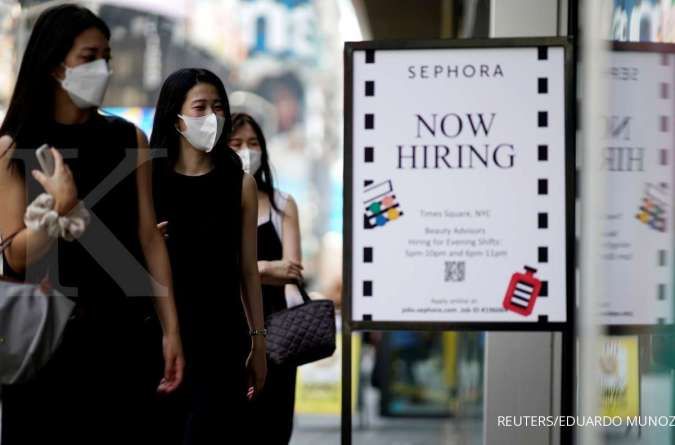AMERIKA SERIKAT / AS - WASHINGTON. U.S. job growth slowed more than expected in April and the increase in annual wages fell below 4.0% for the first time in nearly three years, but it is probably too early to expect that the Federal Reserve will start cutting interest rates before September as the labor market remains fairly tight.
The Labor Department's closely watched employment report on Friday also showed the unemployment rate rising to 3.9% from 3.8% in March amid rising labor supply. Nonetheless, the jobless rate remained below 4% for the 27th straight month.
Financial markets boosted the odds of a September rate cut and saw the U.S. central bank reducing borrowing costs twice this year instead of only once before the data.
Read Also: Dollar Drops as Employers Add Fewer Jobs Than Expected in April
"Today's report was a far cry from the kind of labor market weakness that would prompt a Fed rate cut," said Chris Low, chief economist at FNH Financial. "Nevertheless, more abundant labor and slower job and wage growth should help contain inflation, and that is the key to rate cuts."
Nonfarm payrolls increased by 175,000 jobs last month, the fewest in six months, the Labor Department's Bureau of Statistics said. Revisions showed 22,000 fewer jobs created in February and March than previously reported.
Economists polled by Reuters had forecast payrolls advancing by 243,000. Estimates ranged from 150,000 to 280,000.
April's employment gains were below the 242,000 monthly average for the past year.
The healthcare sector continued to lead job growth, adding 56,000 positions, spread across ambulatory healthcare services, hospitals, nursing and residential care facilities.
Read Also: IDX Composite (IHSG) Rises 0.24% to 7,134 on Friday (3/5)
Social assistance payrolls increased by 31,000 jobs. Employment in the transportation and warehousing industry rose by 22,000 jobs, driven by couriers and messengers as well as hiring at warehousing and storage facilities.
Retailers hired 20,000 more workers. There were modest increases in construction and government payrolls.
Financial markets raised their bets of a September rate cut to about 78% from 63% before the data.
The U.S. central bank on Wednesday left its benchmark overnight interest rate unchanged in the current 5.25%-5.50% range, where it has been since July. Since March 2022 the Fed has raised its policy rate by 525 basis points.
U.S. stocks gained after the data. The dollar fell against a basket of currencies. U.S. Treasury prices rose.
Average hourly earnings rose 0.2% after climbing 0.3% in March. Wages increased 3.9% in the 12 months through April. That was the smallest gain and first reading below 4.0% since June 2021 and followed a 4.1% rise in March.
Read Also: Spot Rupiah Closed Stronger at Rp 16,083 Per US Dollar Today (3/5)
Wage growth in a 3.0%-3.5% range is seen as consistent with the Fed's 2% inflation target. Following news last week that economic growth slowed considerably in the first quarter, the moderation in payrolls could fan worries the economy was rapidly losing momentum in the second quarter.
But the step-down in gross domestic product last quarter was largely because of a surge in imports, reflecting strong domestic demand. Wage growth remains sufficient to support consumer spending and the broader economy.
/2022/01/05/2034240658.jpg)















